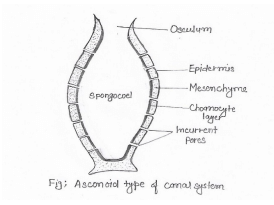UPSC Exam > UPSC Notes > Zoology Optional Notes for UPSC > Porifera: Water Canal System
Porifera: Water Canal System | Zoology Optional Notes for UPSC PDF Download
Canal System in Porifera (Sponges)
The intricate network of water-filled cavities nourishing sponges, from the moment water enters through pores to its exit from the osculum, collectively constitutes the canal system. This system, observed in its simplest form in Olynthus, undergoes a process of growth and folding, leading to the differentiation of three distinct types: asconoid, syconoid, and leuconoid.
1. Asconoid Type:
Description:
- The simplest canal system characterized by a radially symmetrical vase-like body with a central spongocoel.
- Composed of outer and inner epithelium, mesenchyme, and perforated by incurrent pores.
- Choanocytes in the inner epithelium facilitate water current and nutrient exchange.
- Water Current Route:
- From exterior through incurrent pores to spongocoel and out through the osculum.
- Examples: Olynthus, Leucosolenia.

2. Syconoid Type:
Description:
- Evolves from the asconoid type through the formation of radial canals, later developing incurrent canals.
- Choanocyte-lined radial canals and epidermis-lined incurrent canals characterize this stage.
- Internal ostia, prosopyles, and osculum mark the path of water flow.
- Water Current Route:
- Dermal pores to osculum through incurrent canals, radial canals, and spongocoel.
- Examples: Sycon (first stage), heterocoelous calcareous sponges.

3. Leuconoid Type:
Description:
- Develops from syconoid through further out folding, resulting in small flagellated chambers.
- Choanocytes confined to these chambers, mesenchyme filling the intervening space.
- Complex network of incurrent and excurrent canals.
- Water Current Route:
- Dermal pores to oscula through incurrent canals, flagellated chambers, and excurrent canals.
- Variations: Eurypylous, aphodal, diplodal.

4. Rhagon Type:
Description:
- Unique to demospongiae, arising from direct rearrangement of inner cell mass.
- Conical shape with a single osculum, devoid of flagellated chambers at the base.
- Flagellated chambers lead into spongocoel through incurrent canals.
- Water Current Route:
- Ostia to osculum through incurrent canals, flagellated chambers, and excurrent canals.
Functions of Canal System
Nutrition, Respiration, Excretion, and Reproduction:
- The canal system facilitates these vital functions by ensuring a continuous flow of water.
- It transports nutrients, oxygen, and carries away metabolic wastes.
- Enables the transfer of sperm between sponges for fertilization.
- Increases surface area and volume, maintaining a fixed ratio.
In summary, the canal system in porifera plays a crucial role in their physiological processes and contributes to their diverse forms and functionalities.
The document Porifera: Water Canal System | Zoology Optional Notes for UPSC is a part of the UPSC Course Zoology Optional Notes for UPSC.
All you need of UPSC at this link: UPSC
|
181 videos|346 docs
|

|
Explore Courses for UPSC exam
|

|
Signup for Free!
Signup to see your scores go up within 7 days! Learn & Practice with 1000+ FREE Notes, Videos & Tests.
Related Searches

















